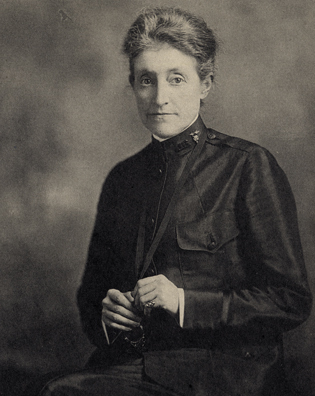 loading
loading
Old YaleYale's first female dean Manuscripts & ArchivesAnnie Goodrich, who became the first dean of the Yale School of Nursing in 1923, had earlier won a Distinguished Service Medal for founding the Army School of Nursing. She is shown here in uniform. View full image
Annie Warburton Goodrich (1866–1954), Yale's first female dean, dedicated her life to improving the long-established hospital and medical policies that gave nurses inadequate training and, often, low-level tasks. She was known as the "mother of nursing education," the New York Times wrote in 1947: her lifelong mission was to revolutionize the education of nurses by improving the practical, hospital-based training then standard and gradually replacing it with university-based professional-school education. At Yale, she realized one of her most important goals when she helped to establish, as founding dean, the first graduate, professional school of nursing in the world. Goodrich grew up in Hartford, Connecticut. Her father was an insurance executive; her grandfather, John S. Butler, Class of 1825, was a psychiatrist and founder of the Institute of Living, one of the country's first mental health centers. In 1890, after her family suffered financial losses, Goodrich decided to become self-supporting and—having observed the poor nursing care her grandfather received during an illness—to become a nurse. She entered the New York Hospital Training School for Nurses, where, as she described it in a speech to Cornell nursing students in 1952, "students were lodged four to a dingy room … and there were no classrooms, either. You did not even require a high school education to enter. … You had to be 25 years old and satisfy the administration only as to your 'maturity, ability, and culture.' Can you imagine that?" Soon after graduating in 1892, Goodrich was appointed nursing superintendant at the New York Post-Graduate Hospital—where she established a high school diploma as a prerequisite for nursing students. In 1900 she became superintendent at St. Luke's Hospital. There she replaced the assembly-line model of nursing with the primary-care model, in which a single nurse provides total care for fewer patients. Beginning in 1904, Goodrich taught hospital economics courses at Columbia University's Teachers College. The nurse and writer Dorothy Deming later remembered "the lightning logic of her class discussions … from which one nurse emerged saying, breathlessly, 'That woman's brain never stops straining at its leash! I'm exhausted!'" In 1917, Goodrich was teaching at Columbia and serving as director of the Henry Street Visiting Nurses Service. When America declared war, the surgeon general of the army appointed her Chief Inspecting Nurse of the Army Nurses Corps. After inspecting 136 military installations, she drew up a plan for an Army School of Nursing. Thousands applied, and 500 students graduated in 1921—the largest class of nurses in any school until then. In 1923, a committee led by Yale public health professor C. E. A. Winslow published a landmark investigation of U.S. nursing education. The report found that hospital-based training programs favored the needs of hospitals over the educational needs of students, and recommended university-based education. Goodrich, a member of the committee, had been advocating this step for years. She had told a meeting of nursing superintendents in 1912: "We have stood knocking at the doors of the college. … We shall never render our full service to the community until our place is found also in the university." The Rockefeller Foundation, which had underwritten the report, gave grants to both Yale and Vanderbilt to establish an experimental five-year university program at Yale. In April 1923, Yale president James Rowland Angell formally offered the position of dean to Annie Goodrich. (When he asked for information he could give Yale's trustees about her previous work, she was well equipped—writing, for instance: "Perhaps you would like to know that the War Department recently awarded me the Distinguished Service Medal as organizer and first Dean of the Army School of Nursing.") In her 11 years of service to Yale, Dean Goodrich faced a number of challenges. The school incorporated the old Connecticut Training School, where students had performed many hospital tasks—and Goodrich would not permit her students to provide what she called "janitorial services." Also, the Yale school had fewer students who worked shorter hours, so the New Haven Hospital had to hire more staff. Goodrich was a woman of strong convictions who wanted the best for her students, President Angell said: "Whatever property of the University she had felt necessary to the successful furtherance of the objectives of the School of Nursing, she requested and usually achieved." By 1934, the year she retired, Yale's entrance requirements were raised to a bachelor's degree. The first Master of Nursing degree was conferred in 1937. After leaving Yale, Goodrich lectured at schools and visited hospitals around the world. During World War II she helped organize the Cadet Nurse Corps to replace public health nurses in the service. At the New York World's Fair in 1939, she was honored as one of the 12 outstanding women of the past 50 years for her contributions to the community. A resolution of the Yale Corporation, issued after her death in December 1954, reads in part: "Wise and fair administrator, untiring in her practice and scholarly in her pursuit of knowledge, she believed that a nurse should be technically skilled, scientifically informed and socially experienced. … Today throughout the world graduates of Yale are carrying on the spirit, courage and devotion to the cause that Dean Goodrich taught by precept and example."
The comment period has expired.
|
|